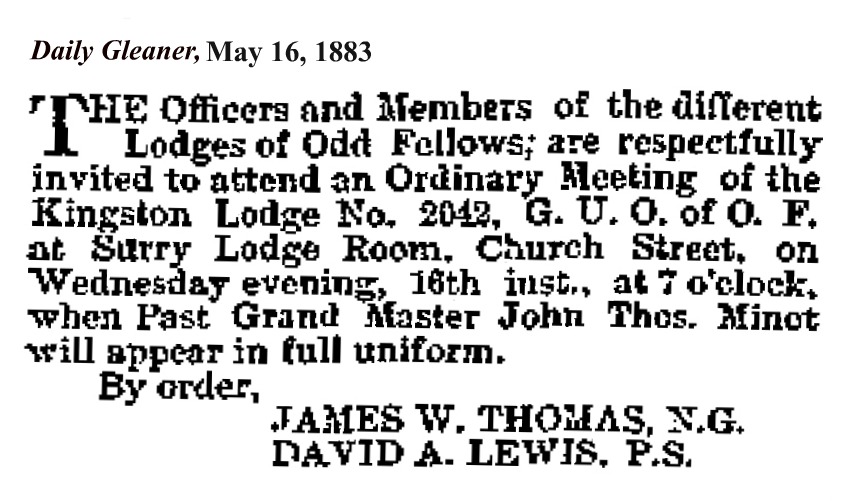
'He was a Free Mason, and an Odd Fellow, and he endeavoured to exemplify in his life the great value of truth, of love and of fellowship.' - from the tribute at his memorial service.
the Odd Fellows connection
The Grand United Order of Odd Fellows - a branch of the Odd Felllows fraternal order which had originated in England; it was established to circumvent the racial exclsiveness of the Odd Fellows in the United States.
Peter Ogden was an African American, though some sources suggest that he came from Jamaica. |
|
Daily Gleaner, March 1, 1910
Peter Ogden, whose picture is reproduced here is known as the father of the Grand United Order of Odd Fellows in America. He was a coloured American by birth, was born at a time when his race was undergoing the pangs of slavery and he grew up a plain unassuming man, anxious for the uplifting of his race. By calling, a mariner, he joined the Victoria Lodge, G.U.O. of O. F. Liverpool, England. In the year 1842, the Philomathean Literary and Musical Society, a coloured association of New York City petitioned the Independent Order of Oddfellows for a dispensation to constitute a lodge, but was refused on racial grounds. Ogden arriving in the city then, dissuaded the Society from making further attempts and informed them of his certainty in the G. U. 0. of O. F. granting them a dispensation.
Braving the dangers of the deep and arriving safely at Liverpool to his mother lodge he made the application. The Lodge unhesitatingly granted the request and the first lodge of the order was established in America as the Philomathean Lodge No. 648 of New York, on the 1st of March 1843. This was not the only service rendered by Ogden to Oddfellowship and through the remainder of his lifetime he was foremost among those who worked for its advancement.
To-day the order embraces over 8,000 lodges, besides Grand Master Councils Patriarchies etc., etc., and Oddfellows in America, in Jamaica and other parts commemorate the 1st of March as Peter Ogden's Day in recognition of the noble work he dld in the interest of the race and the brotherhood of man.
The Grand United Order of Odd Fellows was established in Jamaica between 1879 and 1881; the other branch of the Odd Fellows in the island, the Independent Order of Odd Fellows, Manchester Unity, linked to that order in England, was established later, in 1885. Both appear to have had members of all complexions.
J T Minot's name does not appear among those introducing the G.U.O.O.F. around 1880, but by 1883 he is mentioned as a Past Grand Master, which may suggest that he had joined the organisation while in the U.S.A. at some earlier date. I hope that I may in future find some references to his earlier life, before he is noted as active in Jamaica.

The following newspaper clippings indicate J T Minot's involvement with the G.U.O.O.F. for about a decade from 1883 to 1892; he left the island in 1893, and I have so far found no indication that he re-established contact with the G.U.O.O.F. after his return to the island in 1905 and up to the time of his death in 1916.







Some useful information on the Odd Fellows was given in contemporary editions of the Handbook of Jamaica.



It is of interest that there was an overlap in the membership of the two groups. The name I notice is that of R M Nicholas who appears as an official in both. I assume that this was Robert Mitchell Nicholas, a prominent Black business man - a major building contractor - in Kingston.
Robert Mitchell Nicholas, was born in Kingston in the 1830s into a family already established as members of the Methodist church, especially of Wesley Chapel. He went to the Wesley Day School at the Coke Chapel, and then to the Mico Juvenile School. After leaving school he entered the building trade and later ranked as one of the leading master builders in the city. He was frequently employed on government building contracts. Throughout his life he was a devoted member of Wesley Chapel, serving the church in many capacities. He was also a member of two Friendly Societies, the Odd Fellows and the Foresters. He was widely loved and respected for his kindness, and his service to his community. In 1891-2 he was elected to the City Council of Kingston. When he died in 1893 a considerable congregation gathered to pay their tribute to a devoted family man, churchman and Jamaican citizen.
Two of his children, Arthur and Eva, were later well-known as poets.
Eva and Arthur Nicholas
 |
 |
![]()
